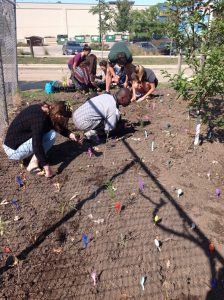
Pollinators aid plant reproduction by transferring pollen from flower to flower. Three-fourths of the world’s flowering plants depend on pollinators to reproduce. Wisconsin’s pollinator dependent crops account for $44 million in annual production.
Wisconsin pollinators include bees, butterflies, moths, flower flies, beetles, wasps, and hummingbirds. Pollinators and bees in particular are currently threatened by an assortment of factors such as pests, pathogens, pesticides, climate change and a lack of nesting habitat and forage plants. Their population and health are declining so efforts are being made to protect them.
Dane County UW-Extension has been leading an effort to develop Pollinator Protection educational materials and outreach efforts. Working in cooperation with the Dane County Environmental Council and the University of Wisconsin staff, Extension has secured funding to be able to develop various educational pieces including a display boards, brochure, informational cards with native plant seeds, and youth activities. These materials that can be borrowed by the public can be found at: https://fyi.extension.wisc.edu/danecountycommunitydevelopment/natural-resources/pollinator-protection-in-dane-county/
Currently Extension has been leading an effort to design and plant demonstration pollinator gardens with permanent educational signage working with leadership teams from County Parks Friends groups, Centro Hispano, and others.
Centro Hispano’s garden was planted by volunteers at a public event in September. Four other gardens are currently being designed and the sites prepared for spring planting events. They are located at Anderson and Silverwood County Parks, Bock Community Garden in Middleton, and at the Lussier Family Heritage Center. For more information on this project contact Mindy Habecker Habecker@countyofdane.com

